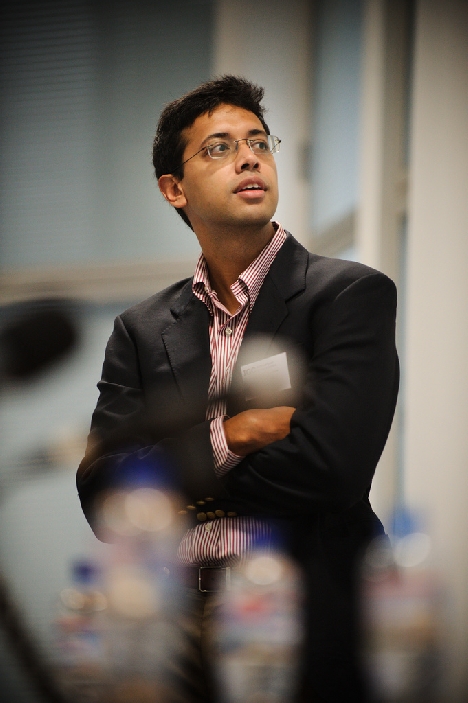Join us for a talk by Professor of Economics at Yale University, Dr. Ahmed Mushfiq Mobarak.
_________________
DATE: Thursday, September 3, 2020
TIME: 9 am (Berkeley) | 12 pm (Yale) | 5 pm (London) | 9 pm (Pakistan) | 9:30 pm (India & Nepal) | 10 pm (Bangladesh) | Calculate Your Local Time
This event will also be live streamed on the Center's FB page: ChowdhuryCenter
_________________
Talk Abstract
COVID-19 is spread through face-to-face contact, and migration therefore plays an outsized role in its global transmission. Effective mitigation policies include limitations on mobility. However, labor migration is a fundamental component of income for large numbers of households, especially in low- and middle-income countries. Using detailed microdata, we document how migration-dependent households have been hit with the dual shocks of higher infection prevalence and greater economic disruption as a result of COVID-19. In phone surveys conducted in Bangladesh and Nepal in April--May, 2020, we find that households with returning international migrants are twice as likely to report experiencing symptoms of COVID-19. At the same time, households that previously engaged in labor migration experience greater declines in household income and food security than those that did not. Bangladeshi households that won a visa lottery to migrate internationally in 2013 experienced sharper drops in income in May 2020 after the COVID-lockdown than lottery-losers. Food insecurity among migrant-dependent Bangladeshi rural households in April, 2020 exceeded that observed during typical agricultural lean seasons. Declines in household welfare are driven by both lower rates of migration and less remittance income from remaining migrants. These losses are not recovered in home labor markets because migrants face difficulty reintegrating. COVID-19 creates a new barrier to migrant reintegration due to stigma associated with the health risks posed by migration.
Speaker Bio
Ahmed Mushfiq Mobarak is a Professor of Economics at Yale University with concurrent appointments in the School of Management and in the Department of Economics.
Mobarak is the founder and faculty director of the Yale Research Initiative on Innovation and Scale (Y-RISE). He holds other appointments at Innovations for Poverty Action, the Jameel Poverty Action Lab (J-PAL) at MIT, the International Growth Centre (IGC) at LSE.
Mobarak has several ongoing research projects in Bangladesh, Brazil, Chile, Kenya, Malawi and Sierra Leone. He conducts field experiments exploring ways to induce people in developing countries to adopt technologies or behaviors that are likely to be welfare improving. He also examines the complexities of scaling up development interventions that are proven effective in such trials. For example, he is scaling and testing strategies to address seasonal poverty using migration subsidies or consumption loans in Bangladesh, Nepal and Indonesia. His research has been published in journals across disciplines, including Econometrica, Science, The Review of Economic Studies, the American Political Science Review, Proceedings of the National Academy of Sciences, and Demography, and covered by the New York Times, The Economist, Science, NPR, BBC, Wall Street Journal, the Times of London, and other media outlets around the world. He received a Carnegie Fellowship in 2017.
Mobarak is collaborating with the government of Bangladesh, NGOs and think-tanks such as BRAC and BIGD, the major Bangladeshi telecom providers, Innovations for Poverty Action, UNDP, other economists, epidemiologists, computer scientists, and public health researchers to devise evidence-based COVID response strategies for Bangladesh and for other developing countries. The approach and results have been covered by BBC, Foreign Policy, New York Times, Washington Post, Vox, and media in India, Pakistan, Bangladesh, Nigeria, Austria, Sweden, Denmark, among others. The work is supported by the Bill and Melinda Gates Foundation, Givewell.org, the Global Innovation Fund, and Yale Macmillan Center.
You can follow him on Twitter: @mushfiq_econ
_________________
Like us on FACEBOOK
The event is FREE and OPEN to the public.

